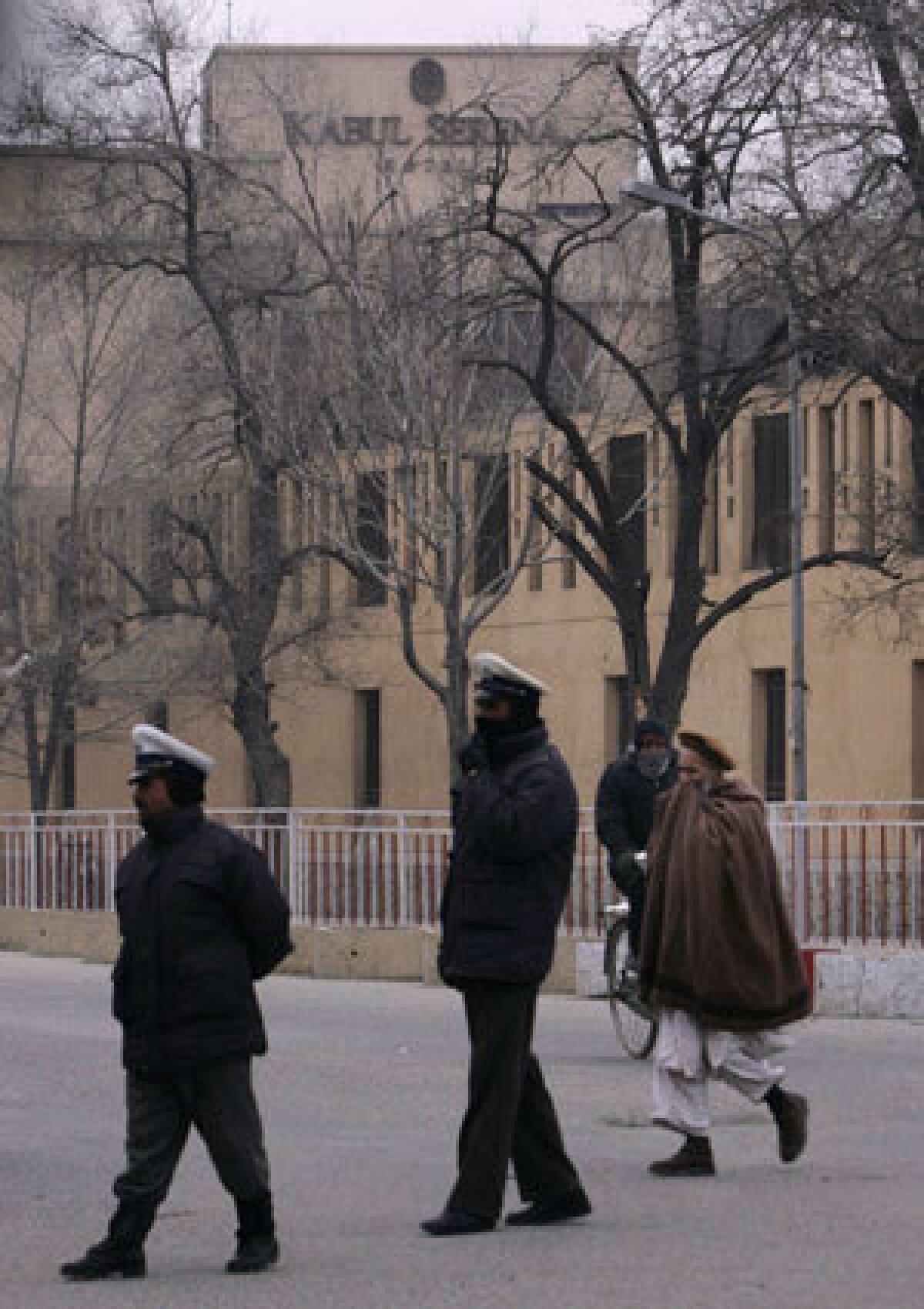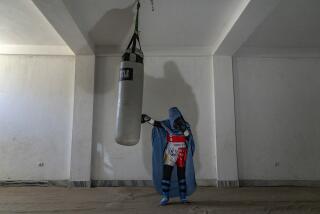Foreigners in Kabul still shaken

- Share via
KABUL, AFGHANISTAN — Shattered glass has been replaced, debris swept away and guests have begun trickling back to the Serena Hotel more than two weeks after Taliban militants killed seven staff members and visitors, sending a shudder through Kabul’s foreign community.
The psychological damage is proving to be harder to repair.
The commando-style attack on the Serena, in which security guards killed a suicide bomber before he could enter the lobby, brought jitters to foreigners living in a city previously regarded as a haven from the violence plaguing much of Afghanistan.
Expatriates were unsettled not only by the strike against one of Kabul’s few international landmarks but also by the Taliban threat to target other places in the capital where foreigners gather.
“There is no panic, but no one’s relaxed,” said Anja de Beer, director of the Agency Coordinating Body for Afghan Relief, an umbrella group for 94 nongovernmental organizations working in Afghanistan. “It’s worrisome. In the back of our minds, it’s a real threat.”
The operative phrase among the United Nations and foreign aid groups is that they are “reassessing security,” and they are advising staff to keep a low profile in their off hours.
De Beer said no organization had pulled up stakes, though some hotel operators say some long-term foreign guests have left the country.
“Our business is business as usual,” said Adrian Edwards, spokesman for the U.N. mission in Afghanistan. “What has changed is that the Taliban has specifically said they will be targeting restaurants where foreigners go, so you won’t see a lot of U.N. staff in restaurants around town.”
Restaurants and bars already have felt a sharp pinch. The most popular spots, some accustomed to serving 80 to 90 people a night, say they have seen their guest count fall to a handful despite increased security.
The bars arrived with the international community after the Taliban was ousted from power in 2001. They cater to foreign aid workers, guards and journalists looking for a social life -- and a drink in a country where most citizens practice Islam, which prohibits alcohol.
But in the wake of the Serena attack, there have been recriminations within the foreign community. Some mutter that a minority of expats courted trouble with wild behavior that offended the modest sensibilities of many Afghans. Bar owners acknowledge that the partying, driven by alcohol and the stress of living in foreign ghettos, occasionally gets out of hand.
Yet others reject any attempt to ascribe blame for the attack to excessive revelry. Most bars and restaurants are located out of sight in fortified compounds where security contractors are urged to check their guns at the door and Afghans are usually banned to avoid the appearance of corrupting Muslims.
“The Taliban aren’t going after restaurants and hotels because [a few people might] behave badly,” said De Beer, noting that the Serena Hotel does not serve alcohol. “These are terror attacks. They are designed to frighten us, not change our behavior.”
In fact, diplomats say the Serena attack accentuates the Taliban’s shift in tactics away from open engagement with U.S. and other NATO forces to suicide bombings and kidnappings aimed not at capturing ground but at spreading fear.
There are some signs that the approach is having an effect. The government’s Afghanistan Investment Support Agency reported Monday that private investment fell by almost half in 2007 from the nearly $1 billion the year before. It blamed the decline of investor confidence on the deteriorating security conditions, including the rise in kidnappings of businessmen.
“These kidnappings are not political. It is criminals kidnapping for extortion,” said Atiqullah Nusrat, membership director of the Afghan International Chamber of Commerce. “But the drop in private investment is because of the security problems.”
The Serena attack and the threat against the Western presence have added to that unease. This week, the foreign community has been awash in rumors that a suicide bomber is moving through Kabul, looking for a chance to strike.
“Things are actually getting better in Afghanistan,” said a Western diplomat who did not want to be identified. “It’s just that it doesn’t feel better.”
That leaves the community caught in a position of having to wait to see whether the Taliban can follow through on its threats and whether more strikes could trigger an exodus of foreign organizations.
“I can cope with a certain amount of danger,” said De Beer, who began working in Afghanistan seven years ago, when foreigners’ movements were far more restricted. But, “to go back to a period of having to isolate yourself? To not be able to talk to your Afghan friends except at the office? That would be a reason to reconsider being here.”
Others remain optimistic that Kabul’s foreigners won’t lie low for long.
“The best people who come to Afghanistan are the ones who don’t like taking orders or following rules,” said Peter Juvenal, owner of a Kabul pub popular with foreigners. “Those people may be staying away now. But I fully expect they will soon get sick of staying in their rooms and playing cards. And when that happens, they’ll be back.”
More to Read
Sign up for Essential California
The most important California stories and recommendations in your inbox every morning.
You may occasionally receive promotional content from the Los Angeles Times.













